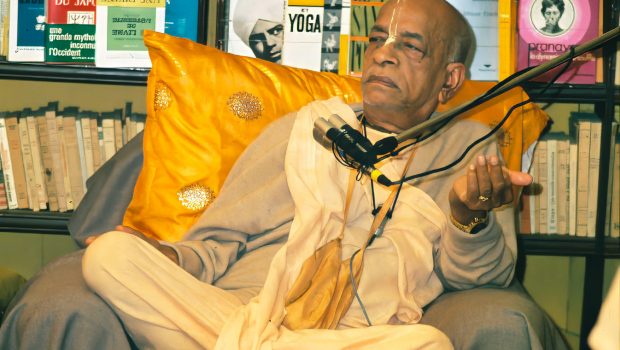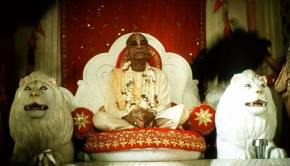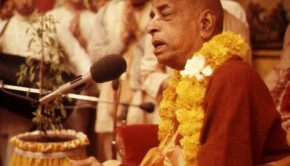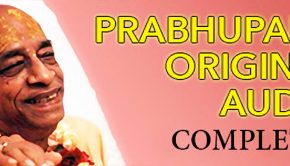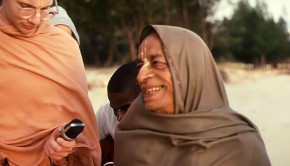Srila Prabhupada Radio Interview Los Angeles 1969
Radio Interview — February 12, 1969, Los Angeles — 690212IV.LA [22:13 Minutes]
Interviewer: We have with us in the studio the head and founder of the International Society for Krishna Consciousness, and I think that his name is pronounced Bhaktivedanta, Swami A. C. Bhaktivedanta.
Prabhupada: Yes.
Interviewer: How long have you been in this country?
Prabhupada: Since 1965, September.
Interviewer: Did you come to found this Society?
Prabhupada: Not exactly, but I came to preach the gospel of Krishna consciousness, and fortunately I met some enthusiasting young boys and girls. So then we formed this Society.
Interviewer: This was in New York?
Prabhupada: Yes. I first came in New York. Then I went to Pittsburgh, and for one year I was traveling, and I established this Society in July 1, 1966.
Interviewer: How many centers are there now?
Prabhupada: There are six centers. Er, why six? Seven. Seven centers. One in New York, one in San Francisco, one in Los Angeles and one, Santa Fe, one, Montreal, one, Boston, one, Buffalo.
Interviewer: And do you spend a certain amount of time in each center? Do you yourself travel from one center to another?
Prabhupada: Yes. I travel… Just like now I am this side, and from here I’ll go to New York. Then I shall go to Boston. Then I shall go to Buffalo. Then I shall go to Montreal. In this way I travel.
Interviewer: And in the main, are the people who have gathered around you younger people?
Prabhupada: Yes. My disciples are all between twenty to thirty years. Generally they are between twenty to twenty-five, utmost thirty years old.
Interviewer: Is that deliberate on your part…
Prabhupada: No.
Interviewer: …or is it simply that that is the age group that has been attracted to your teaching?
Prabhupada: Yes. Yes, yes. That is the fact. I invite everyone, old and young, but generally the youngsters, they are attracted.
Interviewer: Have you any idea what the number of the people are nationally?
Prabhupada: So far initiated members, they are about not less than hundred. But there are many others, admirers. In each center there are at least fifty to sixty members.
Interviewer: I assume that being an initiated member means that the individual has acquainted himself sufficiently with your teaching and gone through certain disciplines? Is that…?
Prabhupada: Oh, yes. Oh, yes. Certainly. That is the first condition to accept one as my disciple. Because there are some restriction. I don’t allow illicit sex life. I don’t allow intoxication. I don’t allow meat-eating and gambling. So I build up that character. So naturally my followers are very restricted. [chuckles]
Interviewer: Well, now, I’d like to go over in some greater detail what the disciples may and may not do. I think that’s where… I just wanted to get some of the factual background before we went into that. Now, your…, the sexual abstinence does not include marriage, I gather.
Prabhupada: No. Marriage allowed.
Interviewer: Marriage is allowed.
Prabhupada: I say “illicit sex.” Without marriage, sex relation is forbidden.
Interviewer: I see. Would you say that there were times when, well, that there were marriages which were also illicit?
Prabhupada: No. Of course, in civilized human society, either in India or in any other country, marriage is considered as sanctified, either in Hindu community or Christian community or Muhammadan community. But apart from that, for spiritual advancement, according to Vedic culture, sex indulgence is always restricted.
Interviewer: Always restricted. For purposes of procreation only?
Prabhupada: No, no. Yes. Sex, sex intercourse, is recommended only for good children. That’s all.
Interviewer: Only to create children.
Prabhupada: Yes, good children.
Interviewer: Good children. Well, if the parents are good, then there is a remarkable possibility that the children may have a chance to be. Is that not true?
Prabhupada: Yes. Yes. That is the fact. That is the fact.
Interviewer: And you said that your followers may not drink? What about the drug picture: marijuana, LSD and those?
Prabhupada: No, no, we don’t… There is no question, because all kinds of intoxication prohibited. We don’t allow even smoking and tea-drinking, coffee-taking. You see? Any kind of intoxication we don’t allow.
Interviewer: In other words, I guess it would be correct to say that this is, in the Western sense of the word, a religious order.
Prabhupada: It is not religious order; it is cultural. Because one cannot understand higher philosophical things if he is intoxicated.
Interviewer: No, I meant the whole, the overall picture of your group. You speak of initiates, you speak of certain disciplines. This is almost — I’m trying to translate it into Western terms — like a religious order.
Prabhupada: No, it is…
Interviewer: Now, you could say philosophical order, a cultural order. But the people…
Prabhupada: Yes. Religious… If you say religious orders, there are many religious orders, they allow all these things. It is not exactly religious order. It is training of consciousness. Because we are trying to put people in original, pure consciousness, which we call, technically, Krishna consciousness. Just like when rain is showered from the cloud, it is pure, distilled water, but as soon as it is in touch with the earth, it is salty, or so many chemicals are formed. Similarly, original consciousness is pure, but when it is contaminated with matter, the consciousness is impure. So we are trying to purify the consciousness. That’s all. That is our program. It is not a religious order. Consciousness is there in every living entity, and we are trying to purify his consciousness. When he comes to his original consciousness, he becomes completely happy.
Interviewer: Does your method include meditation, austerity of various sorts…
Prabhupada: Yes, this is austerity.
Interviewer: …in addition to no alcohol, no drugs? There could be…
Prabhupada: We don’t mention any particular thing. Generally we say “No intoxication.”
Interviewer: But that’s a negative. I’m talking now about… What about the positive aspects of it? Because I have known some very wicked people who never indulged in intoxicants.
Prabhupada: Yes. Yes…
Interviewer: I doubt if that is your dividing line.
Prabhupada: No, no. Simply becoming non-intoxicated does not mean that he is a very good man. That I admit.
Interviewer: Does the method include meditation? What… How do you go about this process?
Prabhupada: So our process is… It is also meditation. But as you understand by meditation, that concentrating the mind upon some super subject matter, the same thing is there, but we don’t try to concentrate the mind artificially. But our this chanting process immediately attracts the mind. Our process is… Just like Hare Krishna, Hare Krishna, Krishna Krishna, Hare Hare/ Hare Rama, Hare Rama, Rama Rama, Hare Hare, we chant it in melodious song. So mind is attracted, and we try to hear the sound. That means my mind and my ear is compact in that thought. Therefore it is practical meditation.
Interviewer: And there is a great deal of the repetitive chanting involved, then, in the meditation? How much is preaching? I mean, supposing you were going…, you are gathered together to accomplish this approach to consciousness. What happens? Do you speak with your disciples?
Prabhupada: Yes, yes.
Interviewer: And do they raise questions, or is it a formalized ritual?
Prabhupada: Yes. First of all we pray to God to help us in the, our, I mean to say, preaching or chanting process. Then we begin chanting this Hare Krishna, Hare Krishna, Krishna Krishna, Hare Hare/ Hare Rama, Hare Rama, conjoinedly, congregationally. And it immediately transfers the atmosphere to a spiritual feeling. And if you sometimes attend our class, you can see practically how the boys and girls, they become ecstatic and chant and dance. So after chanting and dancing for a few minutes, say, fifteen to twenty minutes, then we speak something from Bhagavad-gita and Srimad-Bhagavatam about theology and philosophy, ethics, morality. Then again we chant and pray to God and then close our class.
Interviewer: Is your philosophy, your approach to consciousness, based on the Gita?
Prabhupada: Yes. Yes. Bhagavad-gita. This Krishna consciousness means practical understanding of Bhagavad-gita. This is the sum and substance. I thank you for your capturing the idea. Bhagavad-gita is the sum and substance of the whole Vedic literature, and it is very nicely explained, things as they are. Unfortunately, there are so many interpreters, they interpret the verses in their own way. That is the nonsense of the whole thing. But if Bhagavad-gita understood as it is, oh, it is a great boon to the human society.
Interviewer: In what… Are there fundamental differences between…, or is it simply a difference in approach between your awareness and interpretations and, for example, those of the people who are involved with Zen? With some of the other Eastern concepts? Would you like to…
Prabhupada: Of course, I do not know what is Zen conception, Eastern conception, but we agree with many of them, just like we agree with the concept of God presented by Bible or Koran. That is recognized. And Bhagavad-gita is so simple that it does not require any interpretation. When things are understood directly, there is no question of interpretation. When things are not understood, then you can interpret, I can interpret. So the verses of Bhagavad-gita are so simple that there is no question of interpretation. Unfortunately, I have seen that in Bhagavad-gita commented by a great scholar like Dr. Radhakrishnan, the verse is translated very nicely, and that is done by an Englishman, but he interprets in a different way. So when we can understand the thing very nicely, there is no question of interpretation. You see?
Interviewer: Well, would you say that…, agree with those who say that in the people who have understood, in all the great schools of thought, they have come to approximately, at least, and sometimes almost identical conclusions? The thinking of the great mystics in all religions have been in essential agreement.
Prabhupada: The thing is that religion is a different thing. Religion is a kind of faith. You may have your faith in a certain type of procedure; I may have a certain type of procedure. That is different thing. Suppose you are now Christian. You may change your faith to Muhammadanism. But you as person, you do not change; your faith may change. Similarly, we are concerned with consciousness.
Interviewer: Yes, but so have all of the great teachers been concerned with consciousness. It’s a question of whether or not it’s achieved. I presume that’s why you work at this.
Prabhupada: Yes. But thing is that there are two processes for understanding the Absolute Truth. One is ascending process, and one is descending process. We accept that descending process. Ascending process means trying to understand the Absolute Truth by dint of one’s limited knowledge. Our knowledge… However I may be great, my senses are imperfect. You see? I cannot understand the sun, although I see every day sun, without understanding the sun as it is from authoritative books. Simply by seeing, by…, simply by sense perception we cannot understand. Now this machine, simply by seeing, I cannot understand. But if I hear from authorities that “This is this; this is that,” that understanding is right.
Similarly, Absolute Truth cannot be understood by mental speculation, however a great thinker he may be. It must be understood from the authorities. So that… We follow that principle. We try to understand Absolute Truth from the lips of the Absolute Truth, not otherwise. That is the difference.
Interviewer: And by applying it in…
Prabhupada: In practical life.
Interviewer: In practical life.
Prabhupada: Yes.
Interviewer: That was really what my question was involved in, is that what you believe and what you are can be two different…
Prabhupada: No. What we believe… What we hear, we try to apply in practical behavior. Yes.
Interviewer: And apart from the…
Prabhupada: Just like in the Bhagavad-gita the last instruction is:
sarva-dharman parityajya
mam ekam saranam vraja
[Bg. 18.66]
The Lord Krishna says that “You give up everything. Just surrender unto Me, and I take charge of you.” So we have surrendered unto Him, yes, completely. So what we hear, we do that.
Interviewer: Among your followers, is the part of their lives which is not involved with the rules of your organization or with the formal meetings, are there…? Do they simply proceed with their normal lives and work at jobs and…?
Prabhupada: Yes, yes, work.
Interviewer: I mean, are there any prohibitions as to what type of work? For example, would a follower of yours work in a war industry?
Prabhupada: Yes. If there is no other work, he can work in war industry, because he has to live. After all, he must earn something. Without earning, how can he live? So if there is no better job, he can accept any job. What can be done?
Interviewer: You take no…
Prabhupada: But if we can get a better job… Suppose the war industry or butcher industry, that is also an industry. So if somebody offers some job in the butchery, naturally [chuckling] we are not inclined to accept such job, but…
Interviewer: I believe in the Buddhist philosophy that there are some professions like slaughtering animals and so on, which are…
Prabhupada: So far Buddhist philosophy is concerned…
Interviewer: …and that’s why I wondered if there were prohibitions within, you know, the outside contact with society that you make.
Prabhupada: But our formula is that one should live… It is called sato vrtteh. The vrtti, the profession or the means of livelihood, must be very fair. Must be very fair. Sato vrtteh. Because association will contaminate my mind and my intelligence; therefore, as far as possible, sato vrtti. And this sato vrtti is a Sanskrit word. According to the purification of profession, livelihood, one is called a brahmana, one is called a ksatriya, one is called a vaisya, one is called a sudra, one is called lower than the sudras. You see? So that is also… But in this age one cannot stick to a particular profession. Just like for the brahmanas. The brahmanas… For brahmanas it is enjoined that they should learn scripture and they should preach scripture. That’s all. They have six kinds of occupation. One of the main is this, to learn and to teach. But at the present moment everything has changed. So there is change. But as far as possible, we don’t accept a profession or any job which is abominable.
Interviewer: What else would you like to tell us?
Prabhupada: Yes. I like to tell to everyone that this human form of life is meant for reviving our original pure consciousness. That is called Krishna consciousness. So we should not waste time, because life is very short. And therefore, before we meet next death, we must finish this job of understanding Krishna consciousness rightly, so that our human mission may be fulfilled. Yes. That is what I want to say. This is a very scientific and authorized means of purifying consciousness, and it is very easy also at the same time. It can be accepted without any loss, but the gain is very great. So people should take advantage of this movement and fulfill the mission of human form of life.
Interviewer: Thank you.
Prabhupada: Thank you. [end]

